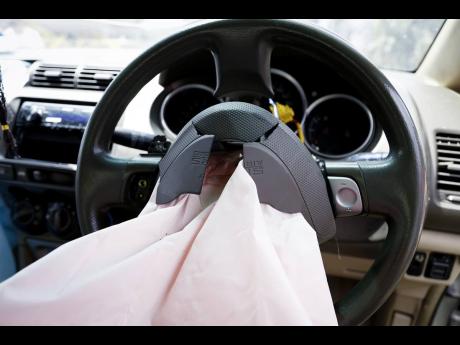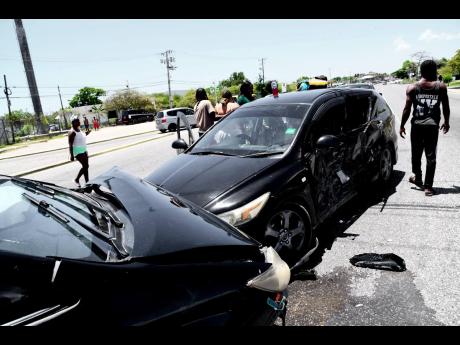Deadly air bags
Car dealership likens problem to ticking time bomb
Tens of thousands of motor vehicles with a deadly air bag defect are operational in Jamaica largely unknown to authorities and their owners, an investigation by The Sunday Gleaner has revealed. It also revealed that measures crafted by the...
Tens of thousands of motor vehicles with a deadly air bag defect are operational in Jamaica largely unknown to authorities and their owners, an investigation by The Sunday Gleaner has revealed.
It also revealed that measures crafted by the relevant government agency to track these vehicles have been stalled for several years.
The air bags were manufactured by the now defunct Japanese conglomerate Takata Corporation. They are among approximately 100 million that were recalled worldwide in the last decade because of explosive inflators that have been blamed for nearly three dozen deaths and over 400 injuries.
The recall covers 34 models of motor vehicles made by 19 different companies, including popular brands such as Honda, Toyota, Nissan, Mazda and Mitsubishi. It involves vehicles manufactured between 2001 and 2016.
The Takata air bags used ammonium nitrate to create a small explosion to inflate air bags in a crash, according to a study done by the United States National Highway Transportation Safety Administration (NHTSA). The study found, however, that the chemical can become more volatile over time when exposed to moisture in the air and repeated high temperatures, causing an explosion that could rupture the air bag inflator and spray metal shrapnel into the passenger cabin with “explosive force”.
A nationwide recall
In the USA, Takata Corporation was ordered by the NHTSA to initiate a nationwide recall of defective air bags on November 18, 2014 after ten automakers in the US had already recalled hundreds of thousands of cars, records show.
Auto industry executives estimate that there were “easily” over 60,000 vehicles operating in Jamaica with defective Takata air bags up to 2019 when local authorities, with assistance from the authorised dealers for some of the top brands, engaged in a series of intervention measures.
But according to them, not much has been done since then despite the fact that thousands of vehicles are being imported annually.
“It's almost like a ticking time bomb,” said Christina Taylor, head of marketing for ATL Automotive, local authorised dealers for Honda and other brands.
“It sounds scary and it sounds cliché and even dramatic, but it's really because the temperature in there [the air bag inflators] can get to a thousand degrees. We have seen instances of back glasses being damaged and it's something everyone needs to take seriously,” she cautioned.
The Trade Board gave approval for the importation of 458,482 motor vehicles into Jamaica over eight consecutive calendar years ending in 2023, according to official data published in the Economic and Social Survey Jamaica (ESSJ).
The Island Traffic Authority (ITA) admitted, in response to questions submitted by The Sunday Gleaner, that it is “not aware” of the current number of vehicles in Jamaica that are under recall for defective Takata air bags.
The ITA is the agency mandated by law to administer the provisions of Jamaica's Road Traffic Act related to the testing of vehicles to ensure fitness, roadworthiness and general compliance with standards of safety.
“This data changes daily due to the respective dealers rectifying issues without reporting to the authority. This specific number can be obtained from Toyota Jamaica or Honda Motors,” the ITA said in an email on July 16.
A block has been placed
However, the agency disclosed a block has been placed in its Vehicle Management System for vehicles with defective air bags, meaning a fitness certificate cannot be issued for them until the issue is corrected.
The ITA said following the announcement of the Takata air bag recall in 2019, it was approached by representatives from Honda and Toyota Jamaica for a list of “active” vehicles from “specific affected years and models”.
The ITA said in 2019 that it shared with ATL and Toyota a list with the unique Vehicle Identification Numbers (VINs) or chassis numbers for “active vehicles in Jamaica that fell within the recall period”. The list included more than 50,000 registered Honda vehicles that were manufactured during the years covered by the recall.
A trace of the VINs confirmed that a total of 26,365 were “affected”, suggesting that they were fitted with the defective air bags.
The ITA said it was unable to provide similar data for Toyota vehicles.
There was no data for the used car industry, which is responsible for a significant chunk of the over 450,000 vehicles imported in the last nine years.
“A large number of grey market cars are brought into the island unchecked,” said one auto industry executive, making reference to second-hand vehicles.
Meanwhile, Taylor, the ATL Automotive marketing manager, said the company was unable to distil from the ITA data the number of vehicles that were still on the nation's roadways at the time. She said during 2019 ATL – through a series of promotional activities dubbed “repaira-thons” – “easily” changed over 12,000 air bags in several different models and model years of Honda, including some not sold by ATL.
But according to Taylor, there were an estimated 20,000 affected vehicles that were unaccounted for at the time. “That number would not be accurate now, it would be way more.”
“We have done everything possible to see the cars that are affected, to pull that information and reach out to customers for them to come into the dealership,” she said, noting that the replacement air bag is free.
Tom Connor, managing director of Toyota Jamaica, said the company has “addressed 89.7 per cent of the affected vehicles”.
Further, Connor said by exhausting all its communication channels, Toyota Jamaica has completed “100 per cent” of the recalls for vehicles that are still owned by the initial purchaser.
The company did not disclose details of the data it received from the ITA or the number of vehicles confirmed to be affected by the recall.
Connor indicated, in an emailed response on July 18 to questions submitted by The Sunday Gleaner, that Toyota Jamaica has engaged the ITA in a “strategic partnership” to address the remaining vehicles impacted by the recall, including those from secondary sales or transfers.
Under this partnership, the chassis number for affected vehicles will be passed to the ITA for detection when the owners attempt to renew their certificate of fitness, Connor explained, making reference to the block imposed by the ITA.
“Once this process is attempted, the owner is sent to Toyota Jamaica for an air bag replacement before a fitness certificate is issued.”


